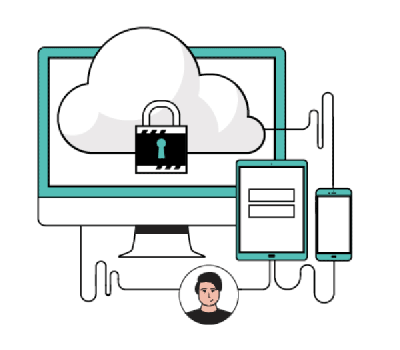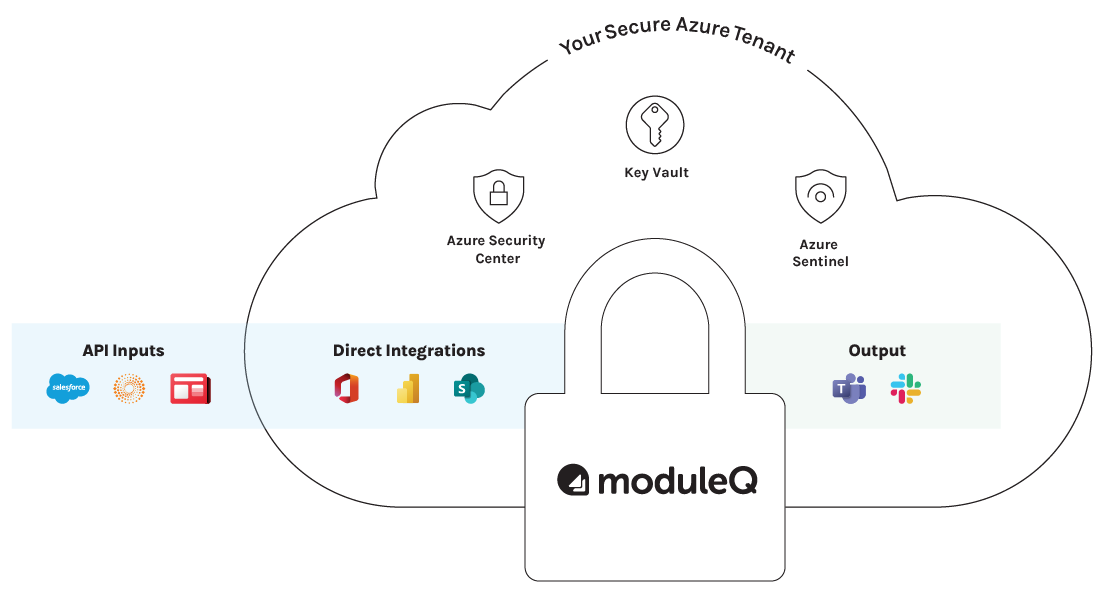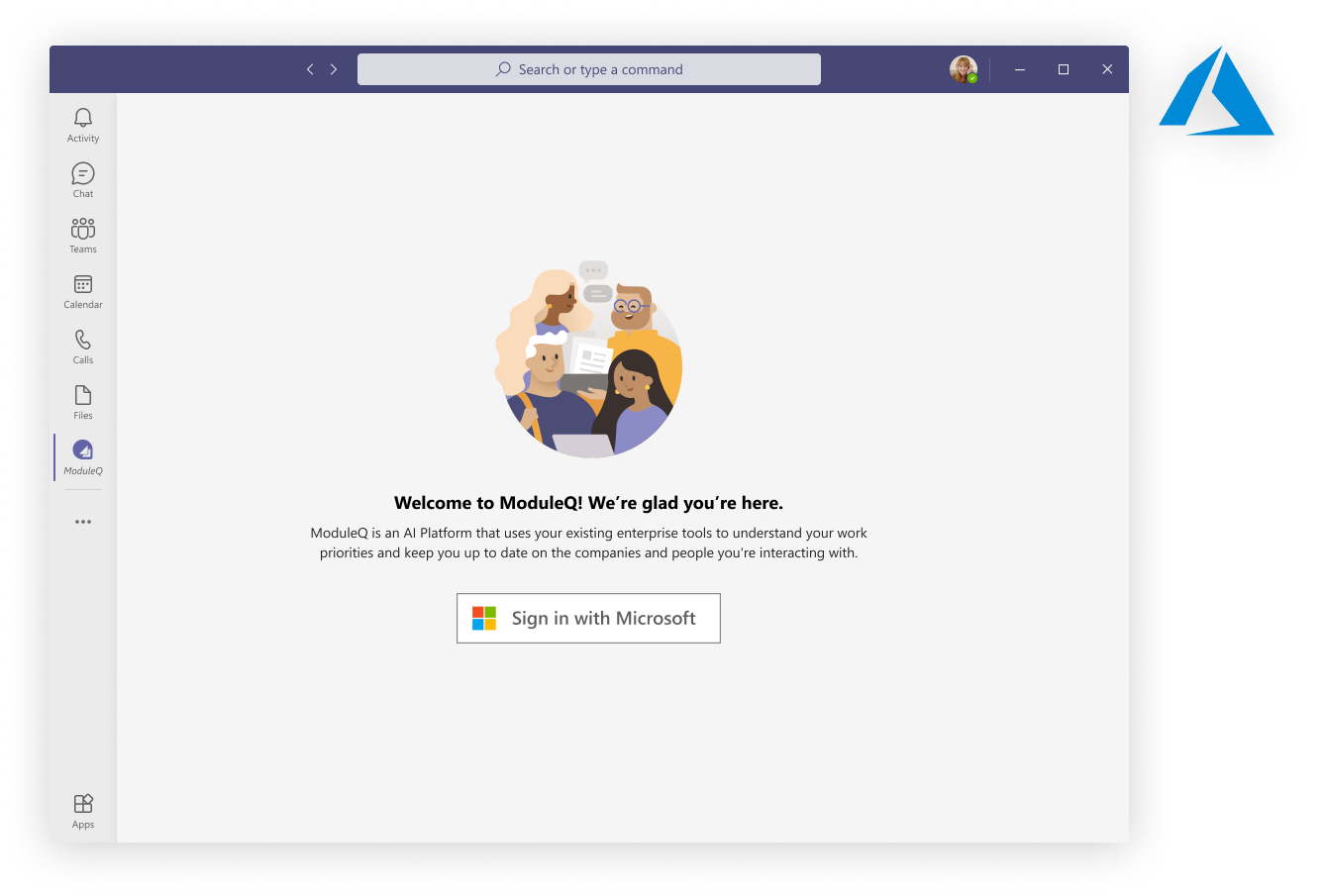Security
Architected to meet the security and compliance needs in regulated industries

Our Security Pillars
ISO 27001 Certified
World-class AI that operates securely at all times, and is continuously validated by an independently audited, ISO 27000-compliant process framework.
Always Encrypted
All data is always encrypted both at rest and in-flight with customer-controlled keys, and information processing is restricted to data actually required by AI algorithms.
Customer Control
ModuleQ's AI engine runs under customer control inside the customer’s Microsoft Azure perimeter, not exposing any data externally.
Azure-first Security Infrastructure

Infrastructure built on Azure
- Security Center infrastructure and vulnerability scanning
- Active Directory authentication and access controls
- Privileged Identity Management just-in-time admin access
- Identity Protection user and sign in monitoring and alerting
- Secret, Token, certificate storage, and management
- Multi-Factor Authentication
- Conditional Access
Why we trust Microsoft Azure
- Azure is the most secure and compliant cloud
- More certifications than any other cloud provider
- The industry leader for customer advocacy and privacy
- Unique data residency guarantees
- Microsoft is committed to GDPR compliance
Security and compliance, built-in
ModuleQ understands that security and data governance are foundational to your business. Frictionless access to internal information and AI-powered personalization cannot come at the expense of security and compliance. You cannot allow traces of your business activity to flow outside of your security perimeter. That’s why ModuleQ delivers software for you to install and operate within your Azure tenant – where you already keep your Office 365 data.

Privacy is our Priority
Personal Space: We want to ensure that you have personal space to innovate and experiment.
Control of Your Data: We don’t share the details of your work without your permission.
No "Big-Brother": We aggregate and anonymize activity metrics to help teams understand what’s valuable.
We Stand With You: We will never sell your information to advertisers.
FAQs
How does ModuleQ know what you're interested in?
At installation, ModuleQ prompted you for some of the top business interests it found in your Office 365 work data. In the background, ModuleQ pulled in and analyzed about 2 weeks' worth of your communication to infer your business priorities and their relative importance. ModuleQ built a communication graph for your interactions and applied a custom unsupervised machine learning algorithm to identify meaningful clusters of people and organizations. These clusters were enriched and refined with domain knowledge about organizations fetched from structured business databases.
Having identified clusters, ModuleQ still needs to figure out the most important ones. During numerous user studies and interviews, we've developed and refined a set of input features that are effective in predicting priority importance to a user. ModuleQ uses supervised machine learning on these features for each. Having identified clusters, ModuleQ still needs to figure out the most important ones. During numerous user studies and interviews, we've developed and refined a set of input features that are effective in predicting priority importance to a user. ModuleQ uses supervised machine learning on these features for each priority to estimate its importance for you. It then ranks the priorities in descending order of importance and displays them in your personalized My Priorities tab.
How does ModuleQ make recommendations?
ModuleQ's recommendation system chooses articles for your daily news update from its content pipeline. ModuleQ's content pipeline aggregates about 60K articles daily from Microsoft News and other RSS feeds.
The content pipeline is designed to handle different types of textual content, such as news and research content. It ingests unstructured textual content and analyzes it to generate descriptive semantic metadata about the content. The pipeline only stores metadata and links to the content, rather than the content item itself. So, recommendations always take you back to content in its original location.
Beyond news, ModuleQ's content pipeline can ingest content and metadata stored in SharePoint and other text document repositories, such as Azure blobs. Untagged content that is sensitive in nature can be annotated with a version of Intelligent Tagging that runs within the organization's own tenant.
Once content metadata has been acquired, it's ready to be considered by ModuleQ's recommendation system. ModuleQ uses your interests and content metadata to score and rank content for your profile. During this ramp-up period, ModuleQ selects 4 articles among the top recommendations for your interests to send in your daily update. The other top recommendations will be visible in the future News tab.
How does the engine decide what a valid search string is or is not?
For topics, we are matching against the set of topics that our tagging system recognizes. For organizations, we match against a database of known business entities this covers just about any business entity that has shown up in a public record.